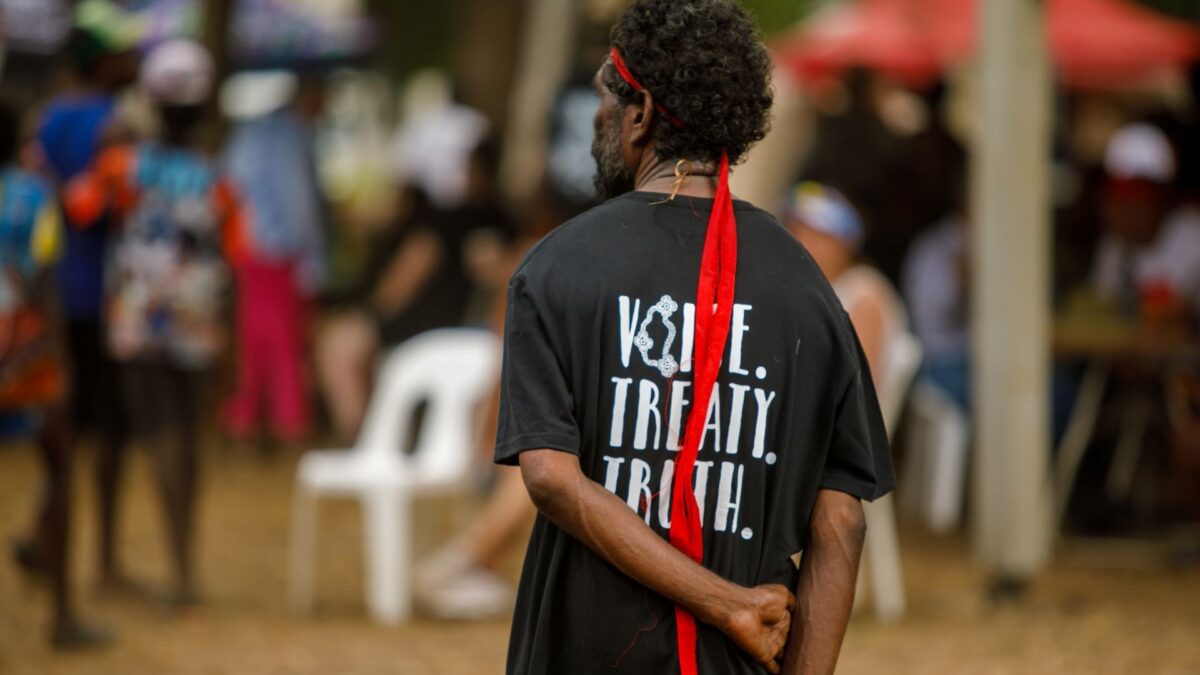Ongoing failure under Closing the Gap a demonstration of need for First Nations Voice


Image credit: Ben Fry / The Uluru Dialogue
If Australians need proof of the need for a First Nations Voice, it can be found in today’s Productivity Commission annual update on Closing the Gap, according to the Uluṟu Dialogue.
Dialogue Co-Chair, Balnaves Chair in Constitutional Law at UNSW, and Cobble Cobble woman, Scientia Professor Megan Davis said the report illuminates the inability of governments to meet their responsibilities and address the appalling circumstances faced by First Nations people, without adequate First Nations input.
The third Closing the Gap Annual Data Compilation Report (ADCR) shows that of 19 socioeconomic targets, just four are on track, four have gone backwards, seven are not on track and progress against the remaining four is unknown due to a lack of data.

“We can’t continue with this same approach and expect different results. It’s time for a First Nations Voice to address these issues by hearing from the very people directly impacted,” Professor Davis said. (Image credit: Ben Fry / The Uluru Dialogue)
“Incredibly, our children are now less equipped to start school than when the National Agreement on Closing the Gap began, more of them are in out-of-home care and away from their families, more of our adults are being jailed, and more of our people are dying by suicide,” Professor Davis said.
“The central objective of the National Agreement on Closing the Gap is ‘… to overcome the entrenched inequality faced by too many Aboriginal and Torres Strait Islander people so that their life outcomes are equal to all Australians’.
“It’s clear this is not happening. Current laws, policies and funding are not making a difference to the lives of First Peoples in the way they should.”
Professor Davis said substantive change was needed.
“We can’t continue with this same approach and expect different results. It’s time for a First Nations Voice to address these issues by hearing from the very people directly impacted,” she said.
“The Voice will lift the bonnet to see why the engine isn’t working and provide actual solutions to problems – not just develop endless reports showing the inadequacies.
“If we are at the table when decisions about us are made and our input leads to better quality laws and policies, the gap will close significantly. But accepting the current approach is accepting these new metrics.
“Later this year, the referendum on the Voice will be an opportunity to make a real difference. Until then, it’s more of the same.
“This is why people should support a First Nations Voice. There is nothing for the Australian public to lose but so much for everyone to gain.”

Professor Davis said a Voice would also scrutinise targets such as those related to First Nations peoples’ legal rights or interests in their land and waters. (Image credit: Ben Fry / The Uluru Dialogue)
Amongst the targets unable to be reported on is one that says that by 2031, all Aboriginal and Torres Strait Islander households will enjoy at least the same quality of essential services as other Australians.
“This will be cold comfort to communities like Yarrabah outside Cairns in far north Queensland, where just last month lead levels in water at the local kindergarten and primary and secondary school were so high that kids had to drink bottled water supplied by health authorities,” said Professor Davis.
“This, despite assurances from government that the town’s water supply complies with the Australian safe drinking water guidelines. Yarrabah is just one example.”
Professor Davis said a Voice would also scrutinise targets such as those related to First Nations peoples’ legal rights or interests in their land and waters.
“A target on land is conveyed as being ‘on target’ but has an array of incoherencies and inconsistencies that need to be unpacked,” she said.
“Clarity is needed as to what ‘success’ means, given the Commonwealth funds non-claimant applications for extinguishment, the ongoing implications of the Timber Creek decision for native title compensation, and many other issues.
“On another target relating to sea, the resolution of native title consent determinations already in the pipeline will probably put the target on track without requiring the government to do anything."
Professor Davis said the Productivity Commission report spoke to the structural nature of First Nations peoples’ problems, referred in the Uluṟu Statement from the Heart as ‘the torment of our powerlessness’.
